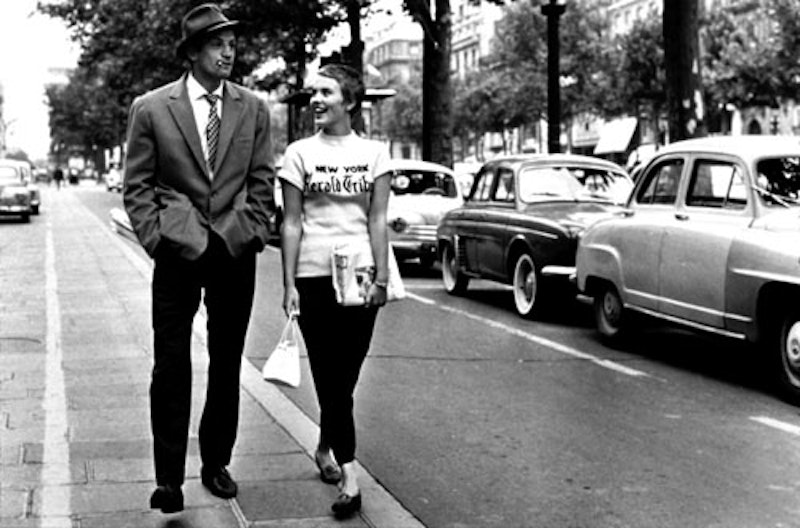Anti-Semitism is not a subject to be treated lightly, and the Hollywood establishment is one of the more unlikely places to be accused of commending it. (One need look no further than Neal Gabler’s well-regarded scholarly history An Empire of Their Own: How the Jews Invented Hollywood, to discern why.) Film studios large and small generally avoid propagating anything that might be viewed as un-P.C., as the recent brouhaha over Vince Vaughn’s calling electric cars “gay” in the forthcoming The Dilemma has shown.
So it’s surprising that the Academy of Motion Picture Arts & Sciences has (so far, at least) treated the issue of Jean-Luc Godard’s evident anti-Semitism lightly, essentially ignoring the topic when it awarded him an honorary Oscar over the weekend. (True to form, Godard skipped the ceremony.) Instead, the evening—which also bestowed what amount to lifetime Oscars to Francis Ford Coppola and Eli Wallach—restricted itself to poking fun at Godard’s general iconoclasm. “Let’s be honest,” said writer/director Phil Alden Robinson. “You [Godard] have said things that undoubtedly have upset everyone in this room, at least once. You have also had unkind things to say about Hollywood and the Oscar—but then again, so has everyone in this room, at least once.” Such remarks got “big” and “knowing” laughs from the assembled, according to Deadline.com, though that may have had more to do with the spectacle of the auteur behind Sneakers saluting the man who made À bout de soufflé, Le Mépris, Week End, and dozens of other masterworks.
As he’s aged and, in many ways, become more strange, Godard has disseminated a viewpoint in both his words and works that can be seen as defiantly anti-Semitic. Washington Post columnist Richard Cohen pulled no punches in a Nov. 2 post on The Daily Beast, enumerating such facts as the director’s having once called a producer a “‘filthy Jew,’ lauded the massacre of Israeli athletes at the 1972 Munich Olympics (‘before every Olympics finale, an image of Palestine [refugee] camps should be broadcast’), and several times equated Zionism with Nazism—the product of a mind pitted with the syphilitic hate we call anti-Semitism. In his case, though, his Jew hatred is camouflaged as anti-Zionism, which is a respectable enough ideology but which is often the snowball that contains the solid rock of anti-Semitism.’”
Godard and his defenders often say that his remarks are meant to be evidence of anti-Zionism—a stance that perhaps Mel Gibson, who won’t be getting an honorary Oscar anytime soon, ought to try. But it’s hard to argue that Godard has tipped over into flat-out anti-Semitism on a regular basis, as noted in Richard Brody’s invaluable, comprehensive, and generally laudatory study, Everything Is Cinema: The Working Life of Jean-Luc Godard.
Noting Godard’s disregard for Shoah and Schindler’s List—which, Brody argues, can largely be ascribed to disagreement over filmic techniques—Brody goes on to quote a Godard interview in which the filmmaker said he wanted to demonstrate “How, in fact, Hollywood was invented. How all the gangsters from New York came to California and took over the film business.” Brody reads “gangster” as “Jew,” and adds: “It was the cinema of this Hollywood, which Jews had created, that betrayed its own birthright and corrupted the cinema, by failing to depict the Holocaust in its time.”
That Jewish filmmakers failed to adequately represent the horrors of the Holocaust as they became known, in the 1940s, is an intriguing topic, but it’s swamped by Godard’s overweening prejudice. Brody calls a spade a spade, referring to Godard’s “anti-Semitic attitudes,” though he tries to lighten the blow by adding that, as the book’s title says, everything Godard does is in defense of how cinema could and should conduct itself.
Heady stuff, and certainly more than a backslapping Oscar event would be expected to bear. Still, does Godard’s art excuse his personal opinions? Cohen raises the always-reliable specter of D.W. Griffith, himself the recipient of an honorary Oscar in 1926. “Just as no one in the film industry could look a black person in the eye after giving an award to Griffith, so it should be just as hard to honor Godard and look history in the eye,” he writes.
I’d say the Godard award equates more with Elia Kazan’s in 1999, when the likes of Nick Nolte and Ed Harris pointedly refused to applaud the then-90-year-old filmmaker due to his naming names during the McCarthy hearings, something that’s still a matter of debate to this day.
Of course, by shunting this year’s honoraria to a ceremony separate from the Oscars themselves—and with Godard’s absence to be expected in any case—the chance to see how the Hollywood crowd would treat the 79-year-old filmmaker will never be realized. That’s probably all for the best.
Jean-Luc Godard and the Jews
An honorary Oscar for Godard renews charges of anti-Semitism.

